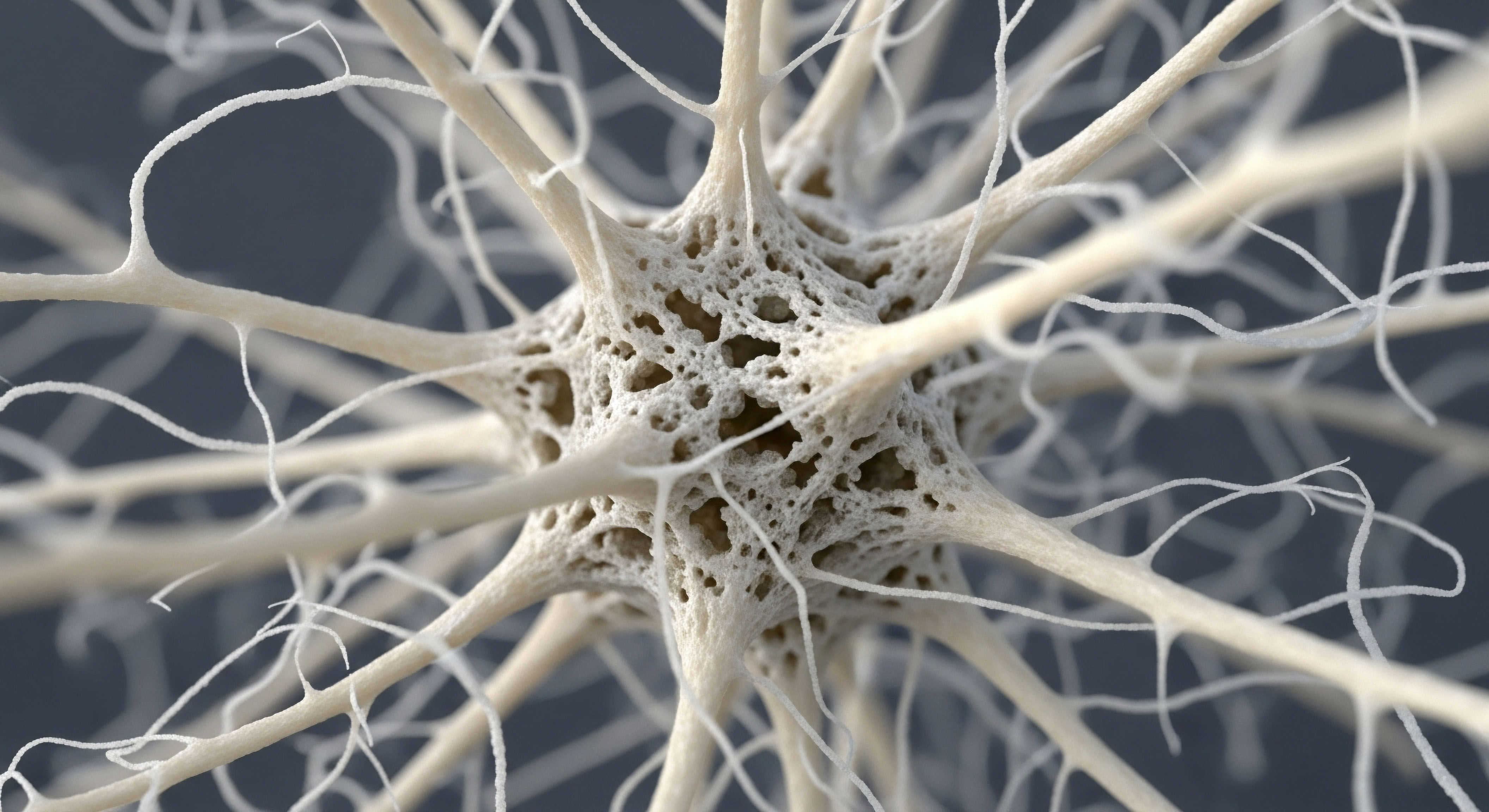

The Endocrine Disruption Protocol
Sleep is the primary signaling event for hormonal production and systemic repair. Its absence represents a direct and immediate chemical assault on the male endocrine system. A study published in the Journal of the American Medical Association demonstrated that restricting sleep to five hours per night for a single week reduced daytime testosterone levels by 10% to 15% in healthy young men.
This decrease is equivalent to aging 10 to 15 years, an accelerated senescence induced by nothing more than truncated rest. This is a state of chosen castration, a voluntary suppression of the very chemistry that defines masculine vitality.
The consequences extend beyond androgenic hormones. Insufficient sleep decouples the intricate relationship between glucose and insulin. Laboratory studies show that even partial sleep deprivation impairs glucose tolerance and reduces insulin sensitivity, forcing the pancreas to work harder to manage blood sugar.
This induced state of insulin resistance mirrors the metabolic dysfunction seen in pre-diabetic individuals, creating a direct pathway to metabolic disease and unwanted fat storage. The body, deprived of its nightly metabolic reset, begins to operate with compromised efficiency, storing energy as adipose tissue and failing to properly fuel muscle and brain tissue.
Just one week of sleeping less than five hours a night can lower a young man’s testosterone levels by the same amount as aging 10 to 15 years.
This state of internal disorder is a direct result of disrupting the body’s non-negotiable cycles of regeneration. It is a silent sabotage, dismantling metabolic and endocrine health from within.


The Nightly System Calibration
The body’s most critical repair and regeneration software runs during sleep. This is an active, precisely orchestrated sequence of physiological events, not a period of passive shutdown. The process is governed by sleep stages, with specific hormonal events tied to each phase.

Deep Sleep the Anabolic Window
The most productive phase is slow-wave sleep (SWS), which occurs predominantly in the first half of the night. This is the primary window for systemic reconstruction. During SWS, the pituitary gland initiates powerful pulses of growth hormone (GH). Approximately 70% of daily GH secretion in men occurs during this phase.
This hormone is the master controller of tissue repair, facilitating protein synthesis for muscle recovery, promoting lipolysis (fat breakdown), and maintaining bone density. Depriving yourself of SWS directly curtails this essential anabolic process.

The Brain’s Cleansing Cycle
Simultaneously, the brain engages in a critical maintenance protocol via the glymphatic system. This network, which is up to 10 times more active during sleep, uses cerebrospinal fluid to flush out metabolic waste products accumulated during waking hours, including proteins like amyloid-beta.
This clearance is most effective during slow-wave sleep, when the space between brain cells expands by as much as 60%, facilitating a more efficient cleansing flow. Inadequate sleep leads to a buildup of this neural debris, impairing cognitive function, memory consolidation, and long-term brain health.
The table below outlines the direct physiological trade-offs between sufficient and restricted sleep, illustrating the nightly calibration process.
| Hormonal/Systemic Process | Sufficient Sleep (7-9 Hours) | Restricted Sleep (<6 Hours) |
|---|---|---|
| Testosterone Production | Peak nocturnal release, robust daytime levels. | Suppressed release, 10-15% reduction in daytime levels. |
| Growth Hormone (GH) | Strong pulses during slow-wave sleep, promoting repair. | Blunted or absent pulses, impairing recovery. |
| Cortisol Rhythm | Low nocturnal levels, healthy morning peak. | Elevated evening/night levels, dysregulated rhythm. |
| Insulin Sensitivity | High sensitivity, efficient glucose management. | Reduced sensitivity, increased insulin resistance. |
| Glymphatic Clearance | Efficient removal of neural waste. | Impaired clearance, accumulation of toxins. |


The Chronology of Biological Debt
The degradation of physiological function from sleep debt is not a gradual decline; it is a rapid cascade. The impacts are measurable within days, not weeks or months. After a single night of partial sleep deprivation, healthy subjects exhibit a measurable increase in insulin resistance. The body’s ability to manage glucose is immediately compromised.
The hormonal consequences follow a similarly swift timeline. The 10-15% drop in testosterone occurs after just one week of sleeping five hours per night. This is accompanied by a subjective decrease in vigor and well-being, confirming that the internal chemical shift has a direct effect on perceived energy and drive. This is the definition of accruing biological debt; each night of inadequate rest compounds the deficit, demanding a higher physiological price.
The glymphatic system, responsible for clearing metabolic waste from the brain, is up to 10 times more active during sleep than during wakefulness.
Reversing this debt requires a dedicated protocol of consistent, sufficient sleep. The recovery is not instantaneous. While some acute effects on insulin sensitivity can improve after a few nights of extended sleep, restoring the integrity of the entire endocrine system requires a sustained commitment. The body must be permitted to re-establish its natural rhythms.
This is a process of recalibration, where consistent sleep signals to the hypothalamic-pituitary-gonadal (HPG) and hypothalamic-pituitary-adrenal (HPA) axes that the period of stress has passed and normal function can resume.
- Immediate Deficit (1-3 Nights): Measurable decline in insulin sensitivity and cognitive processing speed.
- Acute Debt (1 Week): Significant suppression of testosterone and growth hormone; dysregulation of cortisol; impaired glymphatic function.
- Chronic Debt (Months/Years): Elevated risk for metabolic syndrome, obesity, and neurodegenerative conditions. Sustained suppression of anabolic hormones.

The Ultimate Anabolic State
Sleep is not downtime. It is the most potent performance-enhancing protocol available. It costs nothing, yet its effects surpass any synthetic alternative in its ability to govern the entire hormonal and metabolic cascade that dictates health, performance, and vitality. To treat it as a disposable luxury is a fundamental misunderstanding of human biology. It is the nightly foundation upon which all other efforts to build a superior physiology are based. Without it, you are engineering your own decline.



